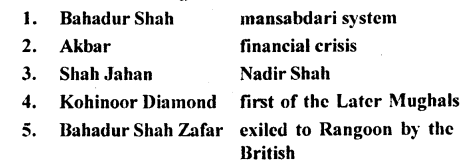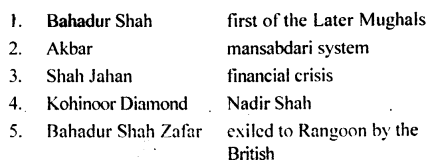A New Combined History & Civics for Class 8 ICSE Solutions Decline of the Mughal Empire
These Solutions are part of A New Combined History & Civics for Class 8 ICSE SolutionsHere we have given. A New Combined History & Civics for Class 8 ICSE Solutions Decline of the Mughal Empire.
Exercises
I. Answer the following questions in not more than 40 words :
Question 1.
Who were the Sayyid Brothers ? What part did they play in Mughal politics ?
Answer:
In A.D. 1712, during the reign of Jahandar Shah, two brothers, Hussain Ali and Abdullah, known as the Sayyid Brothers, became very powerful and played an important role in the Mughal politics with an intention to make the Mughal King a puppet in their hands.
Question 2.
Who was Nadir Shah ? What do you know about his attack on India ?
Answer:
Nadir Shah was the King of Persia. He invaded India in A.D. 1739. He became successful to defeat the Mughal armies and the Mughal power was totally broken.
Question 3.
Who was Ahmed Shah Abdali ? What were the effects of his invasions on India ?
Answer:
Ahmed Shah Abdali was the ruler of Afghanistan. He invaded India several times between A.D. 1747 to 1767. In A.D. 1761, he conquered Punjab and advanced towards Delhi to overpower Marathas.
II. Answer the following questions in not more than 100 I words :
Question 1.
How far was Aurangzeb responsible for the downfall of the Mughal Empire ?
Answer:
There are many loop wholes and draw backs during the reign of Aurangzeb. The destruction of temples and re imposition of Jazia gave bad results by annoying, Marathas and Sikhs who became strict enemies of the Mughal rule. His encroachment towards south created problems to control the enlarged Empire up to North. His weak successors resulted in the upbringing of Bengal,Oudh and Deccan as independent rulers. Besides this,shortage of treasure, demoralisation of Mughal Army, rise of new powers of Punjab and Marathas and foreign invasion and policies totally destroyed the Mughal power.
Question 2.
Why were various people discontented during the reign of the later Mughal rulers ?
Answer:
The later Mughal rulers became selfish, luxurious and unsuccessful administrators. They were not wise and foresighted. They were unable to satisfy the public and lost their confidence through wrong policies e.g. destruction of temples and application of jazia taxes. Their weak :policies and negligence of public welfare disrupted the Mughal Empire, because various governors of Bengal, Oudh and Deccan declared themselves independent rulers. The loss of treasury and demoralisation of Mughal army also added with the decline of the Mughal Empire.
III. Which of the following statements are true or false ?
- Aurangzeb’s Deccan Policy helped in making the Mughal Empire bigger and stronger.
False.
- Shivaji was the founder of the Maratha Kingdom.
True. - The Mughals had no law of Succession.
True.
- Guru Govind Singh transformed the Sikhs into the ‘Khalsa’ or Pure Soldiers.
True.
- The Sayvid Brothers wanted to keep the Mughal kings as puppets in their hands.
True.
IV. Fill in the blanks with appropriate word/words :
- Nadir Shah invaded India and looted the city of Delhi in A.D. 1719.
- The Third Battle of Panipat was fought between the Marathas and Afghans.
- Bahadur Shah, the last Mughal Emperor, was caught and tied by the East India Company for taking part in the revolt of 1857.
- Aurangzeb spent the last 25 years of his life in Deccan, if Where he died in 1707.
Practice Questions
A. Fill in the blanks.
- During the first half of the 18th century, the great Mughal empire decayed and disintegrated.
- The Mughal emperors who ruled India after the death of , Aurangzeb are know’n as the later
- Nadir Shah looted and plundered Delhi He carried away immense treasures including the priceless Kohinoor and the peacock Throne.
- Ahmad Shah Abdali, the ruler of Afghanistan, repeatedly attacked the Mughal empire.
- The last Mughal, Bahadur Shah Zafar, was defeated in the Revolt of 1857 and exiled to Rangoon by the British.
B. Match the following.

Answer:

C. Answer the following questions.
Question 1.
How did part politics undermine the authority and prestige of the Mughal empire?
Answer:
The Mughal court had four groups of nobles i.e Iranis. Turanis. Afghans and Hindustanis. Due to these groups the Mughal court was sharply divided from within. This resulted in a constant struggle for power, mutual jealousies and rivalries between these groups, led to undermine the authority and prestige of the mughal empire.
Question 2.
How did jagirdari crisis lead to a further decline of the emperor’s power?
Answer:
During that time, Mughal rulers used to give jagirs to their officers as payment for their services. Due to this, very few jagirs were left. To satisfy the demands of the newly recruited officers, crown lands were converted to jagir lands and given to the nobles. This led to a loss of revenue from the royal treasury and a further decline in the power of the emperor.
Question 3.
What weaknesses in the Mughal army led to the loss of military strength towards the end of the 17th century?
Answer:
The Mughal army at that time was reorganized system. Under this system mansabs had to maintain a fixed number of troops. For this they were given jagirs as payment. An increase in the number of mansabs and a shortage of jagirs led to corruption, inefficiency in the system and decline in the military’ strength. Further the army was not able to keep pace with the times. Their equipment and techniques of warfare were out of date and ineffective. No efforts were done to reform, modernize and strengthen the army. This all resulted in weakening of the Mughal army.
Question 4.
What effect did the.frequent wars of succession have on the stability and strength of the Mughal empire?
Answer:
After the death of a Mughal ruler, generally there were wars of succession among rival claimants to the throne. These wars proved veiy costly and destructive. They drained the resources of the empire and made it instable and weak.
Question 5.
To what extent were Aurangzeb responsible for the decline of the Mughal empire?
Answer:
Aurangzeb was not a successful emperor. He did not realize the importance of religious tolerance and the support and unity of the people for the progress of empire. His policy towards the Sikhs the Marathas the Jats and the Rajputs lossed their support. His Deccan campaign also proved failure and drained wealth of the kingdom too. This all resulted in decline of the Mughals.
Question 6.
To what extent were Aurangzeb’s successors responsible of the disintegration of the Mughal empire?
Answer:
Successors of Aurangzeb were pleasure-loving weak and inefficient. They were puppets in the hands of powerful, ambitious nobles who controlled the administration. The nobles took advantage of the weak government at the center and set up their own independent kingdoms in the Mughal provinces. This led to the breakup and collapse of the empire.
D. State whether the following are true or false
- Bahadur Shah ascended the’throne after the death of Aurangzeb.
True. - The Mughal count was united and stable.
False
Reason:- The Mughal court was divided and unstable. - Aurangzeb followed a policy of religious tolerance.
False
Reason:- Aurangzeb followed a policy of religious intolerance - The Mughal empire lasted for over 3 centuries.
True - The British ruled over India for a century.
False
Reason :- The British ruled over India for nearly 2009 years.
More resources for ICSE Class 8
- A New Combined History & Civics for Class 8 ICSE Solutions
- ICSE Solutions for Class 8 History and Civics
- Selina Concise Mathematics Class 8 ICSE Solutions
- Selina Concise Physics Class 8 ICSE Solutions
- Selina Concise Chemistry Class 8 ICSE Solutions
- Selina Concise Biology Class 8 ICSE Solutions
- ICSE Solutions for Class 8 Geography Voyage
Hope given A New Combined History & Civics for Class 8 ICSE Solutions Decline of the Mughal Empire are helpful to complete your homework.
If you have any doubts, please comment below. APlusTopper try to provide online tutoring for you.